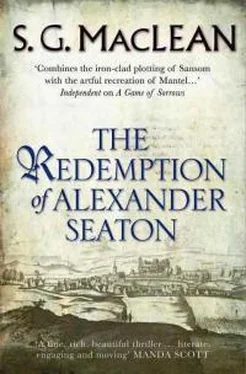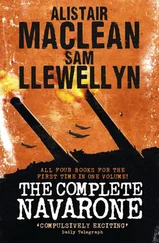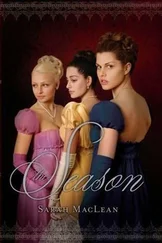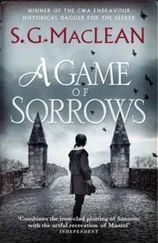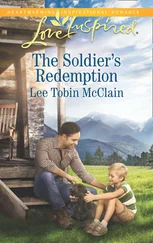‘Stay,’ I said.
‘Alexander …’
‘Come no closer. Do not come near to me.’
‘But Alexander–’
‘You know what has happened. You must know it. It is lost, all lost.’
‘But no, Alexander. No. All that is nothing to me. I love you more than life itself. I would defy God, my father, my mother, and all the legions of Hell to be with you. Alexander, I will not go. I will not marry him. I am yours. I will be yours. Alexander. We can marry and we can live, somehow.’
I was shaking my head at her, stepping back as she took another step forwards. ‘You have lost your mind.’
‘No, Alexander, but I have found my will. I will not leave you.’
She was before me, in all her pale and distracted beauty, and a troop of demons was taking hold of my mind. ‘You must leave me, Katharine, for I will not have you. You say it means nothing to you? Well, it means everything to me, and you have cost me all. All.’ All? What ‘all’ did I think there was without her? What ministry, what life did I think I would have led that did not have her in it? There was none, I knew that now. But I think, truly, in that moment I had been out of my senses, for I had turned from her and strode away, leaving her collapsed and crying in the road, the woman I had sworn to love until the day I died. Sometimes at night, when all the schoolhouse was silent save the noise of the sea at the shore, I would be kept awake by the sound of Katharine Hay’s desperate cries, as she lay weeping where I had left her, lying in the dirt on the road to Sandend. A hundred times on those nights I would have gone back to her, but she was no longer there.
And that I had told last night to William Cargill, the first living soul to hear from my lips how I had rejected the woman who had humbled and dishonoured herself for me. I wanted someone to know me for what I was. The bitterness Jaffray was always counselling me to let go of was at the root of my soul, and my soul knew what I had done.
William had sat silently for a long time after I had finished. He stoked the fire and stared into the flames. Finally he turned to me and said, ‘And yet I know you for a good man, Alexander. And this will pass. All pain will pass.’ We had said nothing further of the matter and had retired to our beds soon after, before the bell of St Nicholas struck midnight. If he could, I knew that William would take the great burden from my shoulder, and tell me I need carry it no longer, and I loved him for it. But William would never understand that should I once put down that rock, the man I had once believed myself to be would be destroyed for ever.
EIGHT
Much Business in Town
And thus I had slept through the early morning bells. I opened the window shutters and looked out. Elizabeth was in the backhand, gathering eggs from her chickens and trying, with little success, to keep the pig from trampling on the vegetable patch. She was much too small and slight for such a task, and soon the old manservant was out in the yard, bidding his mistress leave off such work, before the master should hear of it. She smiled at the chastisement and returned to her eggs.
I washed and dressed quickly, but William was long gone by the time I descended to the warmth of the kitchen. Elizabeth’s eyes were full of kindness – I saw William had told her my story – but she masked it as she could. William was a fortunate man. He had loved Elizabeth from the day he met her. He, a scholar, the son of a schoolmaster, she, a kitchen maid, the daughter of a cooper burgess. They had been promised to each other six years, while he completed his course in philosophy at the Marischal College in New Aberdeen and through all his absence at Leiden in the study of law. Neither had strayed. They had married within three months of his return from the Netherlands and now, as he had told me last night, she was carrying his child.
She regarded me with a mischievous glint in her eye. ‘You slept well, I trust, Mr Seaton. Or is this the accustomed hour of rising for the burgesses of Banff? I had heard of your slovenly ways in those parts, but would scarce have credited them.’
I laughed in return. ‘Mistress, it is the unaccustomed luxury of your linen kist that kept me at my slumbers. We simple fisher folk know but coarse blankets and howling gales in our desolate dwellings. I dreamt I had fallen amongst the luxuries of Babylon, and was loath to extricate myself from their embrace.’
Elizabeth wagged an admonishing finger at me. ‘Mistress Youngson shall know of this loose talk, and then we will see how coarse are the blankets she will find you.’ It had been in the kitchen of the old schoolhouse in Banff that William had first met the girl who would become his wife.
She bade me sit down at the table and ladled steaming porridge into a bowl before me. ‘And then you will have eggs. My hens give the finest eggs in all the town. I sing to them.’
I made to protest that the porridge would do me fine enough, and she had better need of the eggs herself. She would not hear of it. ‘You need restoring. You have got so thin and gaunt, Alexander. Please, let me care for you a little. To see you better will do me more good than all the eggs in Scotland.’
Humbled, I did not know how to respond. The kindness in her was almost more than I could face. She saw my discomfort and made light. ‘Besides, if I consume many more eggs, my child will be born with feathers.’ She chattered on about what a fat wife she would be to William, who made her eat while she was not lying down and lie down while she did not eat. But I knew how worried he was. She had always been a pale girl, and slight, and while her pregnancy had brought a joy to her eyes, her cheeks were faded and those eyes tired. The weariness of her body, with five months of her burden yet to carry, was already evident. I thought of my friend, who had all of the promises life could afford a man in his hand, and prayed God that, if He still listened to me, He would not take them from him.
With a full stomach and a warmth of heart I had not felt in a long time, I set out on my morning’s business. My first call would be at the bookseller’s. David Melville’s shop on the Castlegate had been to me a place of greater delight than all the taverns of Aberdeen, and light though my purse now was, I set off along the street with the anticipation of a child on a holiday morning. The day was sunny and already warm. I decided to take the shorter route to the Castlegate, and avoid the noxious smells of the crafts already rising from the direction of the Netherkirkgate and Putachieside, where the tanners and dyers had been at their work several hours now. I glanced to my left at St Nicholas kirk. It rose, magnificent, dominating the skyline of the town. I had aspired, in the quiet, honest moments when ambition overtook calling, to a pulpit in that kirk. The building had been sectioned into two to allow a more fitting form of worship, now we had severed ourselves from the blandishments of Rome. But I would never preach in either kirk, East or West, now. I passed by a cobbler’s shop; through the open shutter I could see him working at the last, a fine piece of leather turning and moving in his hands. I coveted that leather – my feet were sore and my shoes almost beyond the power of the cobblers of Banff to mend again. I had meant to buy new boots, but the money to pay for them and much else was now in the greedy hand of Sarah Forbes’s uncle in King Edward. Perhaps, before I left town, I would try one of the cheaper cobblers who worked beside the tanners near Putachieside, at the Green.
At the Castlegate, I found the door of David Melville’s bookshop open. I could smell the piles of new books and the rows of well-bound older ones before I was fully in the shop. The bookseller had his back to me, a piece of paper in his hand as he checked a row of Latin grammars on the shelf. Affixed to the inside of the shop door were lists of books for the use of the town’s schools, which all clustered around the back of St Nicholas Kirk on the Schoolhill. I ran my eye down the list for the grammar school. Editions of Cicero, Virgil, Ovid, better and newer editions than Gilbert Grant knew of or I could afford. Melville finished counting off his catechisms and turned to greet me with a furrowed brow and then a broad smile. ‘Well, if it is not Mr Seaton. I have been expecting you these last few days. You said you would be here before the end of March.’
Читать дальше
